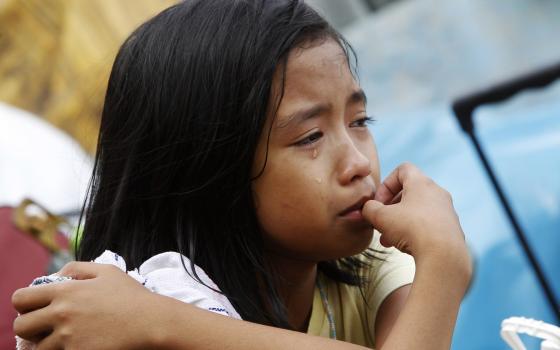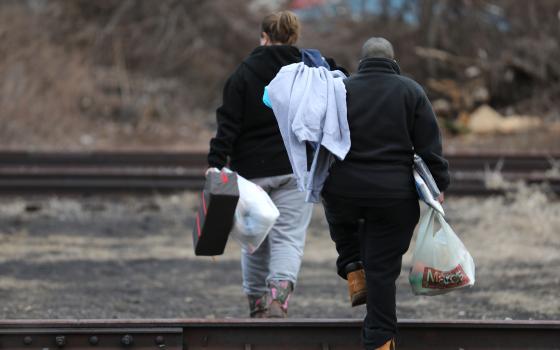In a previous column you met my friend Jennifer, a very depressed woman, an alcoholic, a daughter, a sister and a mother — a woman who was in and out of prison, locked in years of pain and agony. Who wanted to listen to Jennifer's story? Why would Jennifer, who never trusted anyone, want to trust me?
I'm glad she did. Having a place to live and the support of caring people gave her the strength to make a new beginning; she worked through her issues, got a degree and transitioned out of homelessness. More importantly we became lifelong friends and the strength she showed me has stayed with me ever since that initial chance encounter, and will stay with me for life. It was out of Jennifer's experience that I was inspired to start the organization Sophia Housing; furthermore, she became an integral contributor to the initial planning and beginnings of the organization.
Sophia Housing, a ministry of my community, the Daughters of Wisdom, is supported by many other religious congregations through physical, financial and personnel donations. In Ireland it acts in response to the needs of people like Jennifer through services that strive to offer a holistic, person-centered and trauma-informed model of care to individuals and families who are able to successfully transition out of homelessness for the long term.
Sophia Housing's wisdom is in knowing that the provision of a place to live is not the only requirement; rather a professional and compassionate response is needed to support people as they successfully recover from the experience of homelessness. This includes programs and other supports to meet their physical and emotional needs. In July the organization celebrates its 21st anniversary; since its humble beginnings it has helped and continues to help many people like Jennifer.
We all long to find a place where we feel at home. Like everyone else, people with no home want to make their own mark on the world, and like all the rest of us they need to go on a journey – the journey inward. Like all of us they long for intimacy, for belonging, for communion, for relationship. Home evokes feelings of safety, of belonging, of being nurtured, cared for and accepted for who we are.
There is much in our world that is frightening, especially in areas where there is extreme poverty, violence or drug culture. Homelessness often leaves individuals and families experiencing extreme circumstances like these. In such circumstances it is hard to find much to rejoice about, although some people, like Jennifer, quietly and desperately try to create private havens of consolation and diversion by using and abusing drugs and alcohol. Unfortunately, it is circumstances and addictions like these that often create further barriers to individuals and families successfully transitioning out of homelessness.
Family homelessness is a growing social problem affecting families around the world. Homeless women and children are one of society's most disadvantaged and at-risk populations. Family homelessness, once viewed as episodic and situational, has become chronic. While adequate housing is essential to ending homelessness, it is not enough. Families need more than decent housing to thrive: they need social protection "floors," like food, education, healthcare, trauma-informed care and child care services to successfully transition out of homelessness for the long term.
Homelessness is often considered embarrassing, a taboo subject, and in my experience, governments tend to underestimate the problem. I work for a coalition of 22 religious orders of sisters, UNANIMA International — a non-governmental organization that advocates at the United Nations in New York. Our position is that now is the time for a change in how we perceive the problems of homelessness and poverty; it's time for a revolution on the subject!
At a recent meeting in Manila, the Philippines, some UNANIMA members and I met with the "squatters at the creek" — families and individuals who have truly been left behind — and we saw the extremes of their inadequate housing. They welcomed us and fuelled the fire in our hearts to advocate for the eradication of family homelessness.
We urgently need a paradigm shift away from the many abusive attitudes and beliefs that circulate around homelessness. We believe that it is time to give voice and give face to those left furthest behind. We believe we should start a dialogue by viewing and treating homelessness for what it is: a human rights issue. After all, housing is a human right, according to Article 25 of the U.N. Declaration of Human Rights.
So UNANIMA International, in collaboration with Sophia Housing (Ireland), New York University (NYU), and various other partners, is going to address the emergent phenomenon of family homelessness in a new research project. We are going to use a holistic approach to research the structural causes and factors associated with family homelessness, as well as the frequently associated compound trauma experienced by the affected adults and children.
We will use a variety of approaches to explore family homelessness and trauma caused by displacement — like that affecting migrants, refugees and internally displaced persons — taking into account the distinct legal framework upon which those groups are governed. First we will look at five geographic regions: North America, Europe, Australia, Asia and Africa.
By studying root causes, experiences, and outcomes through a range of different perspectives —academia, advocates, United Nations experts, service providers and, most importantly, those who actually have experienced homelessness —this research has the potential to provide detailed and informative outcomes for the regional and international levels. Exploring the root causes and drivers, challenges, good practices and wider issues surrounding family homelessness, we think this research will be valuable in documenting the trauma faced by families who experience homelessness.
Information like this could help service providers and policy makers such as governments to set good standards. It could also provide the resources for creating trauma-informed models of support and effective services for homeless families. We hope that this research will contribute to a badly-needed paradigm shift in how we perceive the issues of homelessness and poverty, and promote a dialogue where homelessness is finally viewed as a human rights issue.
A significant part of the research will involve listening to the experience of homelessness through the voices of women and children. The sisters of UNANIMA advocate for the principle "Don't talk about us, without us" (as Jennifer would say herself). Jennifer's story about her need for housing and support at a critical time in her life cries out for strategies for ending homelessness. We must convince policy-makers to develop strategic approaches that move beyond the management of homelessness, to its elimination.
[Jean Quinn is a member of the Congregation of the Daughters of Wisdom. She is currently the executive director of UNANIMA International, an NGO at the U.N. which is a coalition of 22 groups of women religious. She continues her work with the homeless as the co-chair of the NGO Working Group to End Homelessness.]


